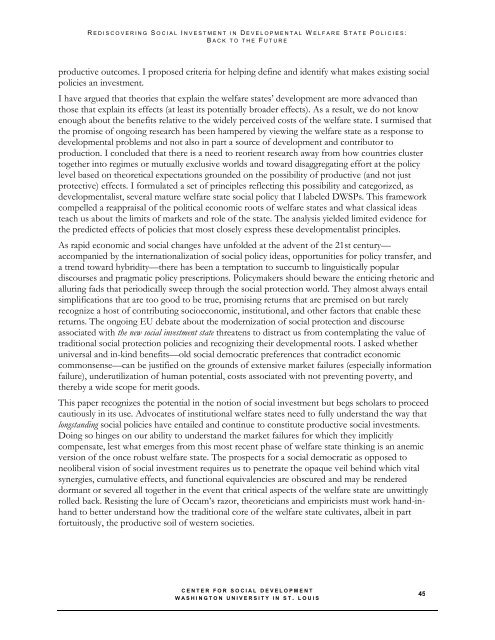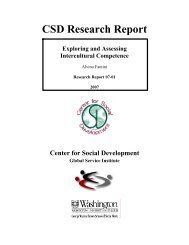Rediscovering social investment in developmental welfare state ...
Rediscovering social investment in developmental welfare state ...
Rediscovering social investment in developmental welfare state ...
Create successful ePaper yourself
Turn your PDF publications into a flip-book with our unique Google optimized e-Paper software.
R E D I S C O V E R I N G S O C I A L I N V E S T M E N T I N D E V E L O P M E N T A L W E L F A R E S T A T E P O L I C I E S :<br />
B A C K T O T H E F U T U R E<br />
productive outcomes. I proposed criteria for help<strong>in</strong>g def<strong>in</strong>e and identify what makes exist<strong>in</strong>g <strong>social</strong><br />
policies an <strong><strong>in</strong>vestment</strong>.<br />
I have argued that theories that expla<strong>in</strong> the <strong>welfare</strong> <strong>state</strong>s‘ development are more advanced than<br />
those that expla<strong>in</strong> its effects (at least its potentially broader effects). As a result, we do not know<br />
enough about the benefits relative to the widely perceived costs of the <strong>welfare</strong> <strong>state</strong>. I surmised that<br />
the promise of ongo<strong>in</strong>g research has been hampered by view<strong>in</strong>g the <strong>welfare</strong> <strong>state</strong> as a response to<br />
<strong>developmental</strong> problems and not also <strong>in</strong> part a source of development and contributor to<br />
production. I concluded that there is a need to reorient research away from how countries cluster<br />
together <strong>in</strong>to regimes or mutually exclusive worlds and toward disaggregat<strong>in</strong>g effort at the policy<br />
level based on theoretical expectations grounded on the possibility of productive (and not just<br />
protective) effects. I formulated a set of pr<strong>in</strong>ciples reflect<strong>in</strong>g this possibility and categorized, as<br />
<strong>developmental</strong>ist, several mature <strong>welfare</strong> <strong>state</strong> <strong>social</strong> policy that I labeled DWSPs. This framework<br />
compelled a reappraisal of the political economic roots of <strong>welfare</strong> <strong>state</strong>s and what classical ideas<br />
teach us about the limits of markets and role of the <strong>state</strong>. The analysis yielded limited evidence for<br />
the predicted effects of policies that most closely express these <strong>developmental</strong>ist pr<strong>in</strong>ciples.<br />
As rapid economic and <strong>social</strong> changes have unfolded at the advent of the 21st century—<br />
accompanied by the <strong>in</strong>ternationalization of <strong>social</strong> policy ideas, opportunities for policy transfer, and<br />
a trend toward hybridity—there has been a temptation to succumb to l<strong>in</strong>guistically popular<br />
discourses and pragmatic policy prescriptions. Policymakers should beware the entic<strong>in</strong>g rhetoric and<br />
allur<strong>in</strong>g fads that periodically sweep through the <strong>social</strong> protection world. They almost always entail<br />
simplifications that are too good to be true, promis<strong>in</strong>g returns that are premised on but rarely<br />
recognize a host of contribut<strong>in</strong>g socioeconomic, <strong>in</strong>stitutional, and other factors that enable these<br />
returns. The ongo<strong>in</strong>g EU debate about the modernization of <strong>social</strong> protection and discourse<br />
associated with the new <strong>social</strong> <strong><strong>in</strong>vestment</strong> <strong>state</strong> threatens to distract us from contemplat<strong>in</strong>g the value of<br />
traditional <strong>social</strong> protection policies and recogniz<strong>in</strong>g their <strong>developmental</strong> roots. I asked whether<br />
universal and <strong>in</strong>-k<strong>in</strong>d benefits—old <strong>social</strong> democratic preferences that contradict economic<br />
commonsense—can be justified on the grounds of extensive market failures (especially <strong>in</strong>formation<br />
failure), underutilization of human potential, costs associated with not prevent<strong>in</strong>g poverty, and<br />
thereby a wide scope for merit goods.<br />
This paper recognizes the potential <strong>in</strong> the notion of <strong>social</strong> <strong><strong>in</strong>vestment</strong> but begs scholars to proceed<br />
cautiously <strong>in</strong> its use. Advocates of <strong>in</strong>stitutional <strong>welfare</strong> <strong>state</strong>s need to fully understand the way that<br />
longstand<strong>in</strong>g <strong>social</strong> policies have entailed and cont<strong>in</strong>ue to constitute productive <strong>social</strong> <strong><strong>in</strong>vestment</strong>s.<br />
Do<strong>in</strong>g so h<strong>in</strong>ges on our ability to understand the market failures for which they implicitly<br />
compensate, lest what emerges from this most recent phase of <strong>welfare</strong> <strong>state</strong> th<strong>in</strong>k<strong>in</strong>g is an anemic<br />
version of the once robust <strong>welfare</strong> <strong>state</strong>. The prospects for a <strong>social</strong> democratic as opposed to<br />
neoliberal vision of <strong>social</strong> <strong><strong>in</strong>vestment</strong> requires us to penetrate the opaque veil beh<strong>in</strong>d which vital<br />
synergies, cumulative effects, and functional equivalencies are obscured and may be rendered<br />
dormant or severed all together <strong>in</strong> the event that critical aspects of the <strong>welfare</strong> <strong>state</strong> are unwitt<strong>in</strong>gly<br />
rolled back. Resist<strong>in</strong>g the lure of Occam‘s razor, theoreticians and empiricists must work hand-<strong>in</strong>hand<br />
to better understand how the traditional core of the <strong>welfare</strong> <strong>state</strong> cultivates, albeit <strong>in</strong> part<br />
fortuitously, the productive soil of western societies.<br />
C E N T E R F O R S O C I A L D E V E L O P M E N T<br />
W A S H I N G T O N U N I V E R S I T Y I N S T . L O U I S<br />
45
















